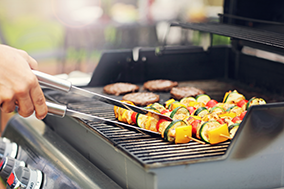I hope you’re enjoying the summer so far.
Things are slowly starting to get better and it’s encouraging to know that our collective efforts over the past few months are paying off. While we’re not out of the woods yet, we are seeing progress.
As things continue to improve, you might have some questions about the local real estate market. Are homes selling? Where are prices right now? What’s the selling process given the restrictions still in place? How are people shopping for new homes?
Getting answers to these questions is crucial if you plan to move this summer or fall. But, even if it’s just for curiosity, it’s always good to stay up to date on what’s happening in the real estate market.
I can help.
I have the latest information and data and can provide you with the answers and advice you need. So, when you have questions, please feel free to reach out to me. I’m happy to help.
 Your neighbourhood has a lot of features that can help you sell your home faster. Unfortunately, buyers don’t usually notice those features just by driving around. So, you need to make sure they get all the information they need about your neighbourhood.
Your neighbourhood has a lot of features that can help you sell your home faster. Unfortunately, buyers don’t usually notice those features just by driving around. So, you need to make sure they get all the information they need about your neighbourhood.
Things are slowly starting to get better and it’s encouraging to know that our collective efforts over the past few months are paying off. While we’re not out of the woods yet, we are seeing progress.
As things continue to improve, you might have some questions about the local real estate market. Are homes selling? Where are prices right now? What’s the selling process given the restrictions still in place? How are people shopping for new homes?
Getting answers to these questions is crucial if you plan to move this summer or fall. But, even if it’s just for curiosity, it’s always good to stay up to date on what’s happening in the real estate market.
I can help.
I have the latest information and data and can provide you with the answers and advice you need. So, when you have questions, please feel free to reach out to me. I’m happy to help.
Using Neighbourhood Data to Help Sell Your Home
 Your neighbourhood has a lot of features that can help you sell your home faster. Unfortunately, buyers don’t usually notice those features just by driving around. So, you need to make sure they get all the information they need about your neighbourhood.
Your neighbourhood has a lot of features that can help you sell your home faster. Unfortunately, buyers don’t usually notice those features just by driving around. So, you need to make sure they get all the information they need about your neighbourhood.For example, say homes don’t go on the market often in your area. That’s an indication that the quality of life in the neighbourhood is so good that no one wants to leave! In real estate, we measure the area’s “turnover rate”, and it’s a handy piece of data to have when listing your home.
Demographic data can also be helpful when selling your property. If your neighbourhood has a lot of families, for example, that’s going to be appealing to buyers with kids.
Other types of data that can help sell your home include:
*Planned local construction.
*Proposals for neighbourhood improvements, such as a new playground.
*Rates at which local property values are increasing.
Any information that shows the advantages of living in your area is going to be useful when selling.
Does Your Home Insurance Cover Everything?
When you suffer damage to your home or its contents, you expect your insurance company to help you out. And, most do a good job of doing just that.
*Planned local construction.
*Proposals for neighbourhood improvements, such as a new playground.
*Rates at which local property values are increasing.
Any information that shows the advantages of living in your area is going to be useful when selling.
Does Your Home Insurance Cover Everything? 
Still, it’s a good idea to review your policy with your insurance advisor and find out what’s covered and what isn’t. For example, you don’t want to discover that your policy will not cover the cost of repairing the damage caused by a flood in your laundry room.
Pay particular attention to coverage in the case of water damage. Some insurance policies don’t cover floods and sewer backup unless an additional rider is purchased.
Also, check liability limits. Ask your advisor to recommend an appropriate level. Finally, make sure you know exactly how much your home is insured for. Are you covered for the full replacement cost? Are you comfortable with that coverage or would you rather only insure for the actual cash value?
Having the right insurance policy gives you peace-of-mind and is an important part of enjoying your home.
Having the right insurance policy gives you peace-of-mind and is an important part of enjoying your home.
BBQ Maintenance that Can Save Your Life 

According to the National Fire Protection Association (NFPA), more than 160 people are injured each year in BBQ mishaps. That doesn’t sound like a lot considering the number of people who flip burgers on their backyard grills each year. But, you certainly don’t want to be one of those who get injured!
The best way to prevent fire and injury is maintenance. Remarkably, few people are even aware that BBQ maintenance is necessary. It is.
Every summer, experts say you should clean out the venturi tubes. Those are the little metal pipes that carry propane or natural gas. Pipe cleaners work well, although hardware stores also carry specialized tools for this purpose. The goal is to clean out any built-up dirt and debris. Don’t be surprised if you find spider webs inside a venturi tube!
Your BBQ grills should also be cleaned with soap and water each year. Just scraping them before barbequing isn’t enough. Fat and oils from cooking can build up on grills and harden. If you’re getting a lot of flare-ups, this may be the cause.
Finally, make sure nuts and bolts are tightened regularly, and replace any rusty hardware. Regular use, heat and weather can loosen or weaken bolts, particularly on the frame. Several fires each year are caused by BBQs tipping over or collapsing.